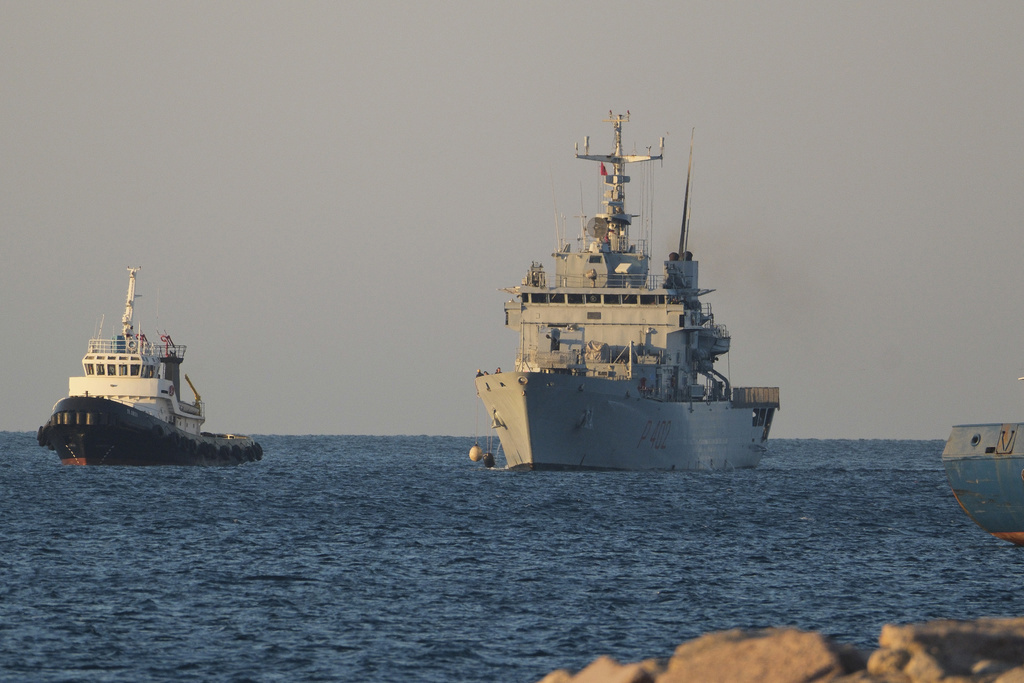
The first 16 migrants sent to Albania after being rescued at sea while trying to reach Europe by way of Italy have arrived at the port of Shengjina board an Italian navy vessel, marking an extraordinary change in the handling of Mediterranean migration.
The men – 10 Bangladeshi nationals and six Egyptians – were rescued on Sunday from various migrant vessels that left Libya days earlier, according to Italy’s Coast Guard.
Egypt and Bangladesh are among 22 countries deemed “safe” by Italy, a designation that prevents their nationals from qualifying for political asylum, with few exceptions.
READ MORE: ‘Spoilt fool’: Magistrate blasts private school boy
Under the protocol signed between Italy and Albania last year, those sent to Albania must not show signs of torture, illness or vulnerability or be part of nuclear families traveling together. Those brought directly to Italy instead would fall under EU regulations, which involve a lengthy asylum process.
The men were vetted on the Italian Coast Guard vessel and then transferred to an Italian Navy vessel, which turned them over to Italian authorities in Albania.
There, they will be guided through an expedited asylum application that will take less than a month, in sharp contrast to the long process in Italy, according to the plans laid out by Italian Prime Minister Giorgia Meloni.
An Italian judge will hear each case via video link, and immigration lawyers will be provided in Albania. If they are denied asylum in Italy, they will then be deported back to their countries of origin at Italy’s expense.
The Albanian off-shoring scheme was designed as a deterrent for those trying to reach Europe, according to Meloni, who signed the bilateral protocol with her Albanian counterpart last November.
READ MORE: Real estate agent ‘flees country with stolen fortune’
The UN refugee agency, UNHCR, will have permanent monitors at the centers for the first three months of the scheme to ensure there are no inconsistencies with international and regional human rights standards, Filippo Ungaro, UNHCR’s Italy spokesperson, told CNN Tuesday.
“UNHCR, which was not part of the original negotiation or language in the Italy-Albania protocol, has agreed to carry out this monitoring role in order to help ensure that the protocol is implemented in a manner that safeguards the rights and dignity of asylum-seekers,” he said.
“UNHCR staff will have direct access to, and the opportunity to observe, the different stages of the process, and will examine the identification, screening and vulnerability assessment procedures. They will also monitor the treatment of relocated persons and the conditions of asylum-seekers in the centres.”
At the end of the initial three-month period, UNHCR will make assessments and recommendations that will be available to the public, he added.
READ MORE: Australia to have biggest naval precinct in southern hemisphere
The scheme has received strong condemnation from human rights groups, which fear that it will be a precedent for other nations wishing to offload migrants to third party countries that may not have stringent human rights regulations.
A small group of activists gathered at the entrance of the port to protest the arrival of the migrants, holding a banner saying, “The European dream ends here”.
“This deal is against human rights, more concretely the migrants’ rights,” said Edison Lika, a protester.
The International Rescue Committee IRC called the opening of the centres a “dark day for the EU’s asylum and migration policies” and said it hoped that the Albanian protocol would not be a blueprint for others.
“Keeping people trapped behind barbed wire, deliberately out of sight and out of mind, is not a sustainable solution to Europe’s migration challenges,” IRC’s EU advocacy director, Marta Welander, said in a statement to CNN Tuesday.
“While the number of people arriving in Italy has diminished in recent months, the number attempting the treacherous crossing to Spain has soared,” Welander added.
“These approaches do not prevent people risking their lives to reach Europe, they simply drive them onto ever more dangerous routes.
Meloni brushed off the criticism, telling Italy’s upper house of parliament that she hopes the plan does set a path for other nations to follow. “It is a new, courageous, unprecedented path, but one that perfectly reflects the European spirit and has all the makings of a path to be taken with other non-EU nations as well,” she said Monday.
More than 1 million migrants have made it to Italy by sea from North African ports since 2014, according to Italian government statistics and UNHCR.
More than 30,500 have died or disappeared on the same route since 2014, according to the UN’s International Organisation for Migration.
– Reported with Associated Press.
links to content on ABC
9News





